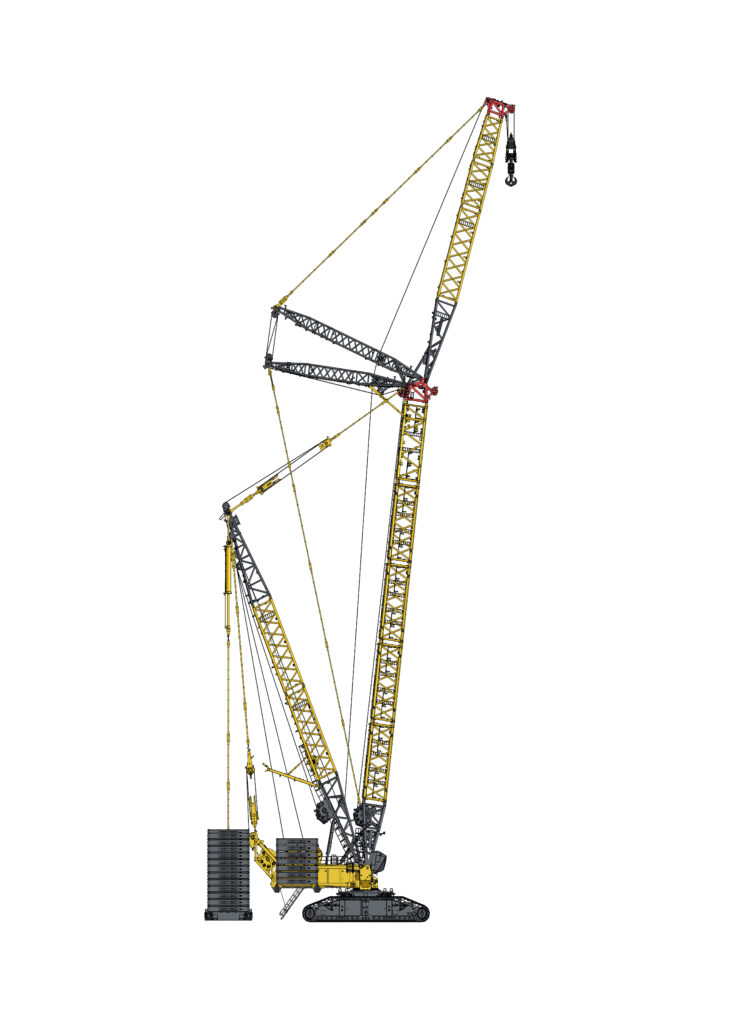Liebherr has unveiled its latest crawler crane with the slogan “Game changer for tomorrow’s energy” – the LR 12500-1.0 with a capacity of 2,500 tonnes supplements the portfolio below the LR 13000. The design of the slewing platform and the main boom sets new standards as the uniquely wide main boom gives the crane the stability of a PowerBoom. Liebherr calls the new boom construction the HighPerformanceBoom. Despite the enormous capacity of the new crawler crane and the size of its individual components, Liebherr has managed to deliver it with a unique, practical concept for its economical transport.

The demand from the market for large crawler cranes is growing, for example in the petrochemicals industry and port handling involving enormous components for offshore applications. Driven by the energy revolution, part weights are increasing all the time, particularly when handling components for offshore wind turbines. Liebherr has decided to meet this challenge with a new crawler crane – the LR 12500-1.0 will be added to the portfolio of lattice boom cranes between the 1,350 tonne LR 11350 and the LR 13000 which has a lifting capacity of 3,000 tonnes. With its enormous lifting capacities and unique transport concept, it has been designed as an economical crawler crane for global projects.
Maximum capacity with HighPerformanceBoom
The key to high lifting capacities are wide lattice booms. The solutions to date have been a double boom like the PowerBoom or the widespread SX systems. However, the Liebherr designers chose a completely different path in the design process for the LR 12500-1.0 – the wide, powerful HighPerfomanceBoom is introduced into the turntable in an optimized way. This is made possible by a special superstructure front section, which is transported on a low-bed trailer at a width of 4 meters.
The slewing platform is supplemented by a 3.5 metre wide rear section which is also home to the two power units. Two Liebherr 6-cylinder in-line engines deliver a total of 800 kW/1088 bhp. They have a redundant design to increase the crane’s availability. There is no separate power pack. The two main hoist winches are also on this rear section.
Smart solutions for economical transport
The intermediate sections of the HighPerfomanceBoom each measure 10 metres in length and are reduced to an economical transport size by a refined mechanism. A separate device stabilises the lattice section during the erection process on site.
The chain is removed and transported in containers for transporting the crawler carriers, each of which weigh around 150 tonnes. The remaining chain girder is divided and moved on two low loaders. The 25 tonne ballast slabs are identical to those used on the LR 13000. They have the same dimensions of a 20 foot container to ensure they can be transported particularly economically and can be loaded using a spreader.
The LR 12500-1.0 is designed for a transport width of 3.5 metres. Only two components of the new 2,500 tonne crane have a transport width of 4 metres.
Modular boom system
The maximum hook height of around 200 metres is achieved by the new LR 12500-1.0 using a 100 metre main boom and a 108 metre luffing jib. Installed with a short length, the luffing jib also acts as a particularly powerful WV jib. The “vessel lifter” is ideal for the erection of long columns in petrochemical plants.
The maximum 110 metre HighPerformanceBoom can be extended to a 155 metre boom using parts of the luffing jib. The ballast pallet on the derrick boom of the LR 13000 acts as suspended ballast. If the crane has to operate without suspended ballast in constricted conditions, it can also operate without derrick ballast in what is known as a B0 version. This principle has also been adopted from the LR 13000. The suspended ballast is infinitely adjusted with the derrick boom. The ballast radius can be


 Copyright 2017-2025 All rights reserved.
Copyright 2017-2025 All rights reserved.